Uncategorized
Bipin Joshi was in Israel for 23 days before Oct. 7. This week, he was buried in his native Nepal.
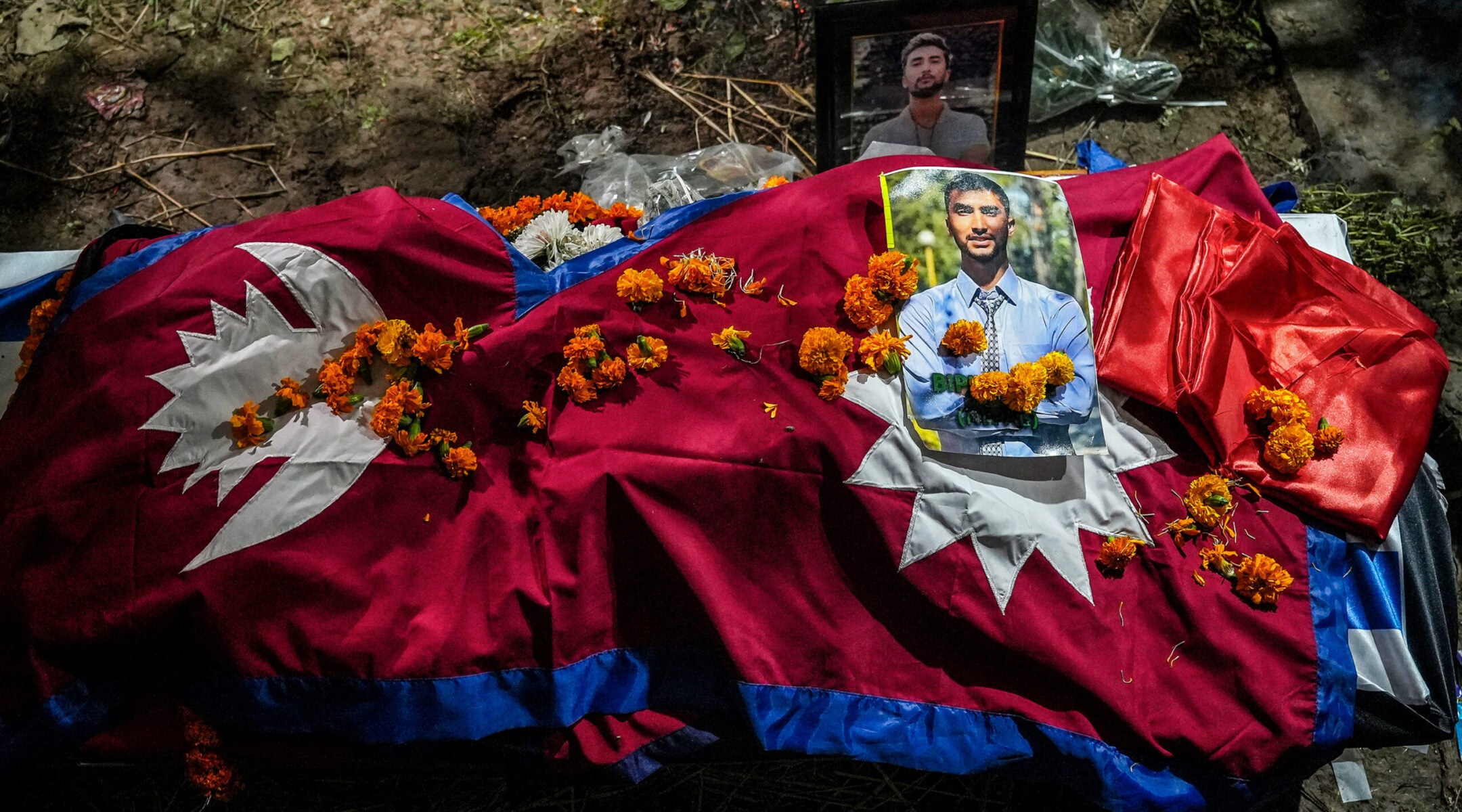
This story was excerpted and adapted from the book “10/7: 100 Human Stories,” winner of the National Jewish Book Awards’ 2024 Jewish Book of the Year and The Natan Fund’s 2025 Notable Book Award.
Bipin Joshi wasn’t supposed to be sent to the Gaza border.
At 23, the tall young man carried his family’s aspirations on his shoulders — he was their firstborn son, their vessel of promise.
Home was Kanchanpur in Nepal’s fertile westernmost reaches, where the Mahakali River nourishes borderlands renowned for abundant harvests. There, Bipin first envisioned transforming agricultural knowledge into prosperity — he dreamed of a banana plantation that would secure his family’s future.
Israel was meant to be just a brief detour on his path to building something lasting back home.
When he enrolled in the Learn and Earn program that purported to offer students from Africa and Asia the opportunity of earning relatively high wages while taking classes in high-tech agriculture. Bipin had been assured placement in Israel’s heartland. But his assignment was changed at the last moment, and he was placed at Kibbutz Alumim, two miles from the Gaza border. Yet any disappointment he felt gave way to relief: He would be working with Himachal Kattel, his best friend and roommate from college in Nepal. In Alumim, the two Nepali young men resumed their familiar schooldays routine, sharing a modest room where, after exhausting days of fieldwork, they would unwind with cold beers and songs from home.
A month later, Himachal and Bipin were some of the only students left alive from their cohort, nearly 3,000 miles from their home in Nepal, when Hamas attacked Alumim.Through the lemon and orange orchards, dozens of Hamas terrorists rampaged the Kibbutz, shooting indiscriminately. They killed 22 Thai and Nepali citizens, kidnapped eight, and injured a few more.
Tribhuvan International Airport, Kathmandu | Sept. 13, 2023
Himachal, a 25-year-old from a small village in the mountains of Gorkha, sported a large red Tika on his forehead at the Tribhuvan International Airport in Kathmandu. This was a blessing from his older sister, Niruta. He was the youngest of four siblings.
All 17 students awaiting their midnight flight were adorned with Tikas, a token of pride and blessing from their families.
In Nepali culture, they serve as good-luck charms and vouchsafes for significant journeys. Many parents had come to the airport, some in tears, others bearing gifts. It was a long goodbye — their children were leaving for 11 months.
They were making the trip for the money, and the education: they were supposed to earn more in a year in Israel than they’d earn in a few in Nepal, as well as gain skills that would advance their careers.
Aged between 22 and 25, most of the students had been raised in poverty.
Prabin Dangi, 24, was hoping to support his chronically ill mother back home, but found that despite his education, good jobs in Nepal were scarce. This was a common dilemma in his family, as one of his brothers was working in Dubai and another in Saudi Arabia for the same reason. His mother pleaded with him, her youngest son, not to leave, but he was determined to provide her with the best possible care.
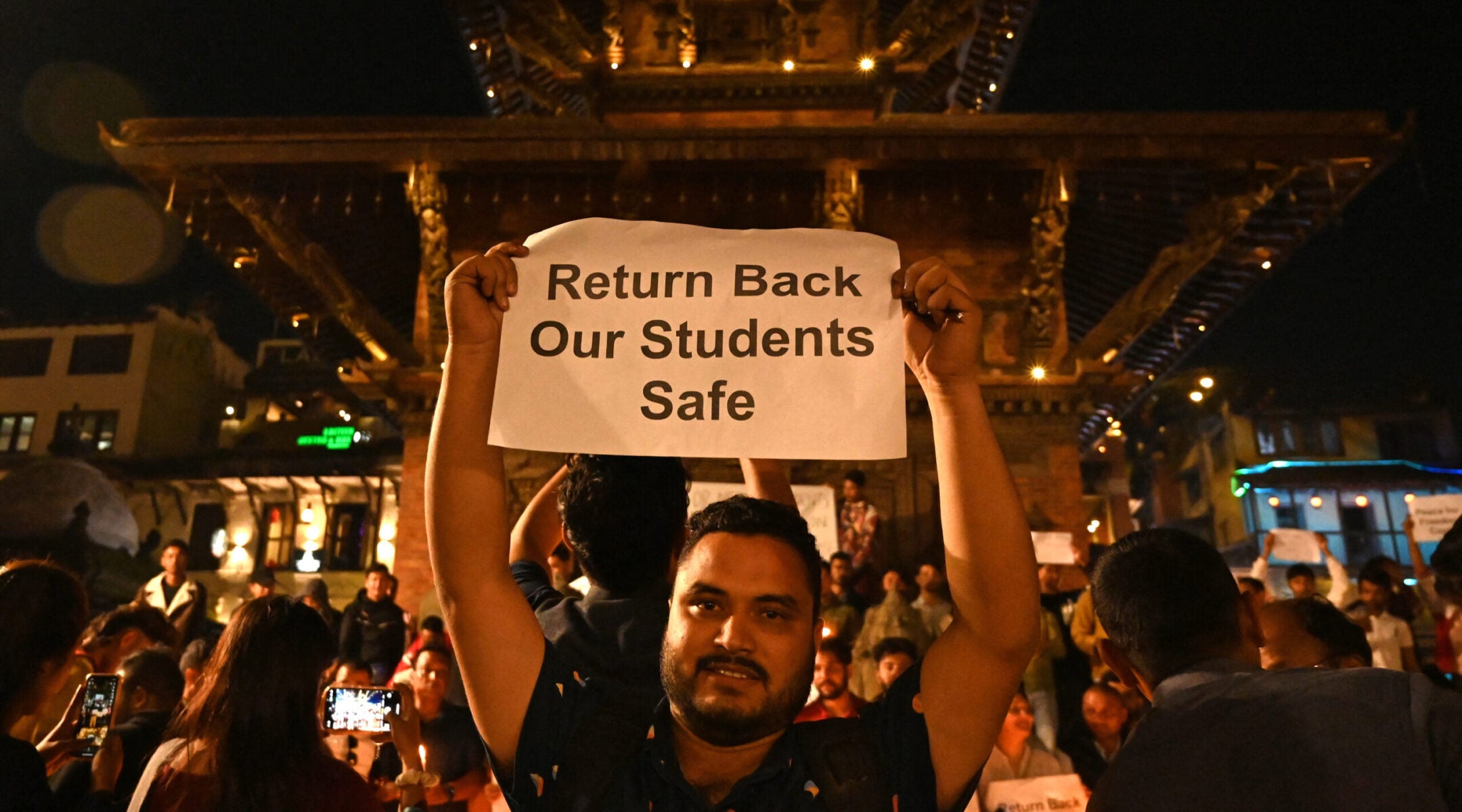
Students take part in a candlelight vigil in Lalitpur, Nepal, on Oct. 9, 2023, in memory of Nepali citizens who were killed in Kibbutz Alumim, in Israel. (Prakash Mathema/AFP via Getty Images)
Ananda Sah, 25, had promised his grandmother that he’d build a house for her. Dipesh Raj Bista, 24, planned to finance his younger brother’s medical studies, being the sole supporter of his family after the death of his father.
And Joshi traded his musical ambitions and writing talent for practical skill: He wanted to learn advanced agricultural techniques that he could apply back home.
The group was sent to a classic “old-style” kibbutz named Alumim, where they shared responsibilities and lived communally. The kibbutz population — a community of 500 — was a mixture of religious jewish immigrants from Arab countries, members of the U.K.’s largest Orthodox Jewish youth movement, agricultural workers from Thailand and now, them as well.
Thai labor, along with Nepali labor, became Israel’s agricultural backbone after Palestinians (who had previously replaced Israeli farmers) were restricted from working in Israel in large numbers following the first intifada in the 1980s. Security concerns about terror attacks led Israel to seek an inexpensive workforce sourced from countries uninvolved in the conflict.
Kibbutz Alumim | Sept. 14-Oct. 6
The students arrived in Israel in mid-September: warm, sunny days.
Soon after arriving, the students’ expectations collided with reality. The communal socialist principles they’d heard about didn’t seem to apply to them.
Their accommodation consisted of small cramped rooms equipped with bunk beds to maximize space.
Their days began around 4 a.m., when they’d gather in the cramped, gray kitchen to cook the lunch they’d bring with them to the fields, before heading out to do arduous physical labor under the sun, which typically lasted until approximately 4 p.m.
Prabin, Padam and Rajan were responsible for managing the kibbutz’s irrigation system. Their duties included carrying heavy pipes out to the fields, assembling the pipes and connecting them to the irrigation system, and fixing malfunctions.
Himachal and Bipin worked together in the orchards, trimming trees, and picking and packing pomelos and oranges. The work was simple, not technically advanced; it was difficult for them to ignore a sense of disappointment.
Each evening of the three weeks the Nepalese cohort spent there, many students called home, reassuring their families that their time in Israel, though it was draining, was a wise investment in their future.
They clung to the hope that their situation would improve once the university opened in October – the “Learn” portion of the program, which involved attending classes at Ben Gurion Negev University once a week.
On Oct. 3, an earthquake struck Nepal, and many were concerned for their families. Padam Thapa called home anxious on October 6. His sister-in-law, Mekhu Adhikari, told him about the frightening aftershocks. Ganesh Nepali urged his elder brother to look after their parents and stay safe, as their family home had sustained structural damage.
Kibbutz Alumin, the Foreign Workers Zone | Oct. 7
Himachal had stayed up until 3 a.m., engrossed in the final season of “Vikings” on Netflix. Saturdays offered the only chance for sleeping in.
Drifting off with his earphones in, he didn’t hear the sirens. At 6:30 a.m., Bipin woke him, urging, “We need to get to the shelter quickly.”
In the other room, Prabin, still half-dressed, rushed to the bunker, witnessing rockets slicing through the sky.
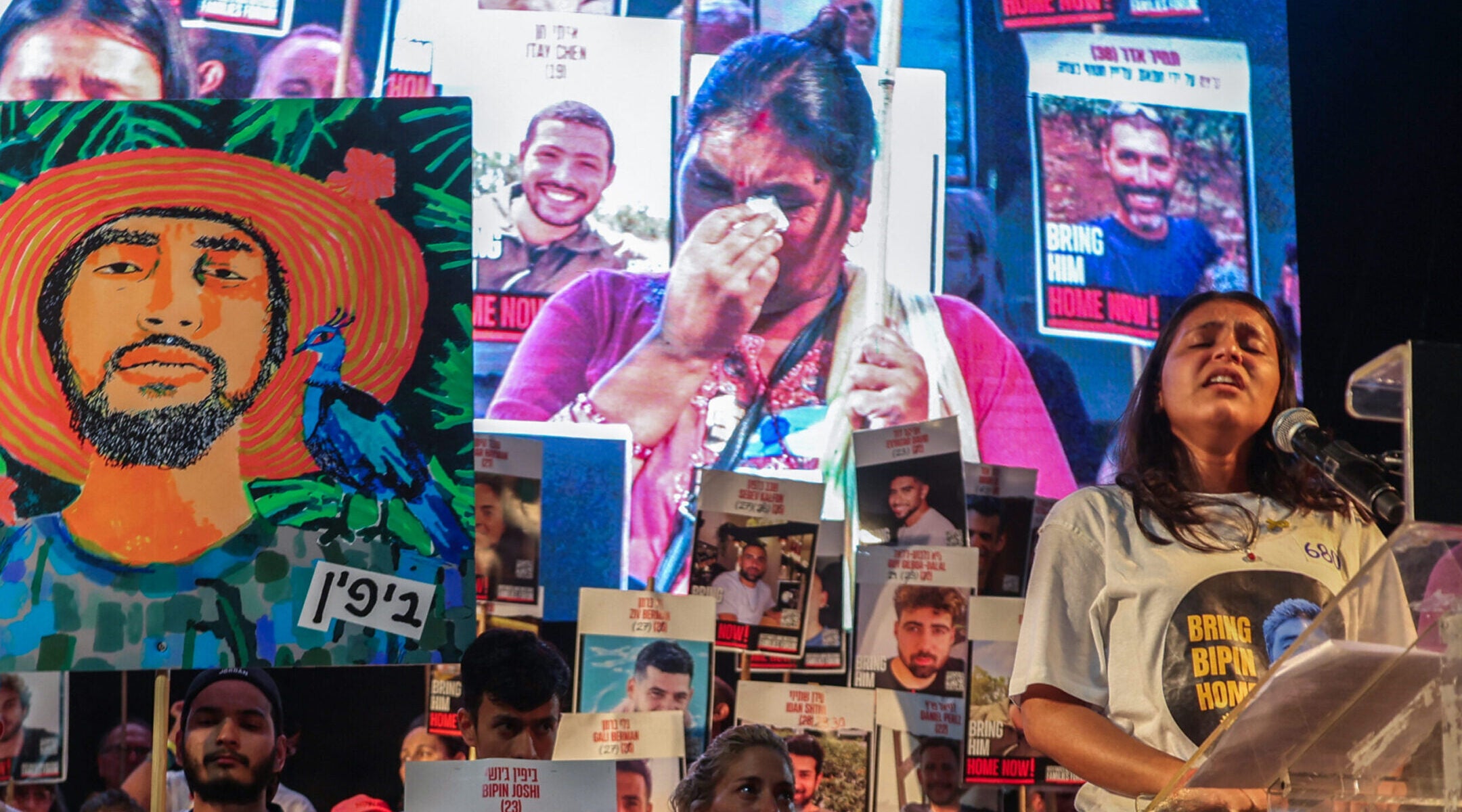
Padma (screen) and Pushpa (podium) Joshi, the mother and sister of Nepalese national Bipin Joshi held hostage by Palestinian militants in Gaza since 2023, address a demonstration organized by the families of hostages calling for action to secure their release in Tel Aviv on Aug. 16, 2025. (Jack Guez/AFP via Getty Images)
The 17 students were confined in the open-door shelter for more than an hour, waiting for instructions. This was the first missile attack they’d ever experienced. They’d been reassured before that rocket attacks from Gaza were common but rarely harmful, and told that staying inside a shelter would keep them safe. To pass the time, they divided into teams, playing Ludo on their phones.
Meanwhile, Rafi Babian, a kibbutz member and the security officer of the Sdot Negev Regional Council, was worried: The sheer number of missiles being fired was unusual. He headed to the council’s headquarters to activate the emergency center. En route, he was warned at the Reim intersection about the presence of terrorists nearby and soon after received an alert about terrorists approaching the gate of his home, Kibbutz Alumim. He notified the kibbutz a few minutes before Hamas arrived. By 6:45 a.m., the entire kibbutz emergency response squad, comprising a dozen members, was armed and ready. Fifteen minutes later, about 20 terrorists were at the kibbutz gate.
The Nepali students didn’t know any of this. They assumed the noises they heard were from missiles. They didn’t know that terrorists riding motorcycles and mopeds were already firing RPGs.
The emergency squad prevented the terrorist from reaching the kibbutz’s residential area — a few civilian-volunteers and soldiers were killed in the battle — but no kibbutz members were harmed.
The terrorists, having been repelled, went looking for another target. They found the workers’ quarters, near the cows and orchards.
From their shelter, the students heard loud Arabic being spoken by the approaching terrorists. Thinking the Arabic was Hebrew, they were relieved: someone had come to help them.
Dipesh Raj Bista stepped out of the shelter, followed by Ganesh Nepali, who just needed to use the restroom.
Outside the shelter, they were met by two men in black, pointing guns at them. Realizing these weren’t kibbutz-members, Dipesh Raj Bista yelled, “We are Nepalese!”
Gunfire was the response.
Dipesh and Ganesh were killed on the spot.
Soon after, a grenade was thrown into the shelter where the 15 other students were hiding. Bipin immediately realized what happened and threw the grenade back out. But he couldn’t catch the grenade that followed, and five of the students were injured. Ananda Shah was severely bleeding, clutching a pillow to stifle his screams. Lokendra Singh Dhami, bleeding too, was whispering about his wife, his 5-year old daughter, and his 2-year-old son.
Prabin, Himachal and Bipin weren’t hurt. They had huddled in a corner of the room, squeezing so tight together that it was hard to breathe. Together, they called one of their bosses, pleading, “Please help us, we’re in trouble.”
The response was short: “I’m so sorry, I can’t help you. There are terrorists attacking all over, I’m hiding too.”
Narayan Prasad Neupane wasn’t as gravely injured as the others: despite having lost three toes, he could still walk. He happened to have remembered the number of the Israeli emergency medical services and called for an ambulance. The operator, speaking English, assured him that help would arrive.
Soon after, two men in blue uniforms entered the shelter. “Please don’t hurt us,” the few students still alive begged.
“We’re the police, the Israeli police,” the men assured them.
“Please, take us to a hospital … these people are dying … get us out of here.”
“There are still terrorists outside,” the police said. “It’s impossible to move you now, but we’ll be back. Everyone who can walk, you need to move to a different place; it’s not safe in the shelter. Go to the kitchen or to your room.”
“And leave the wounded here?”
They had no choice.
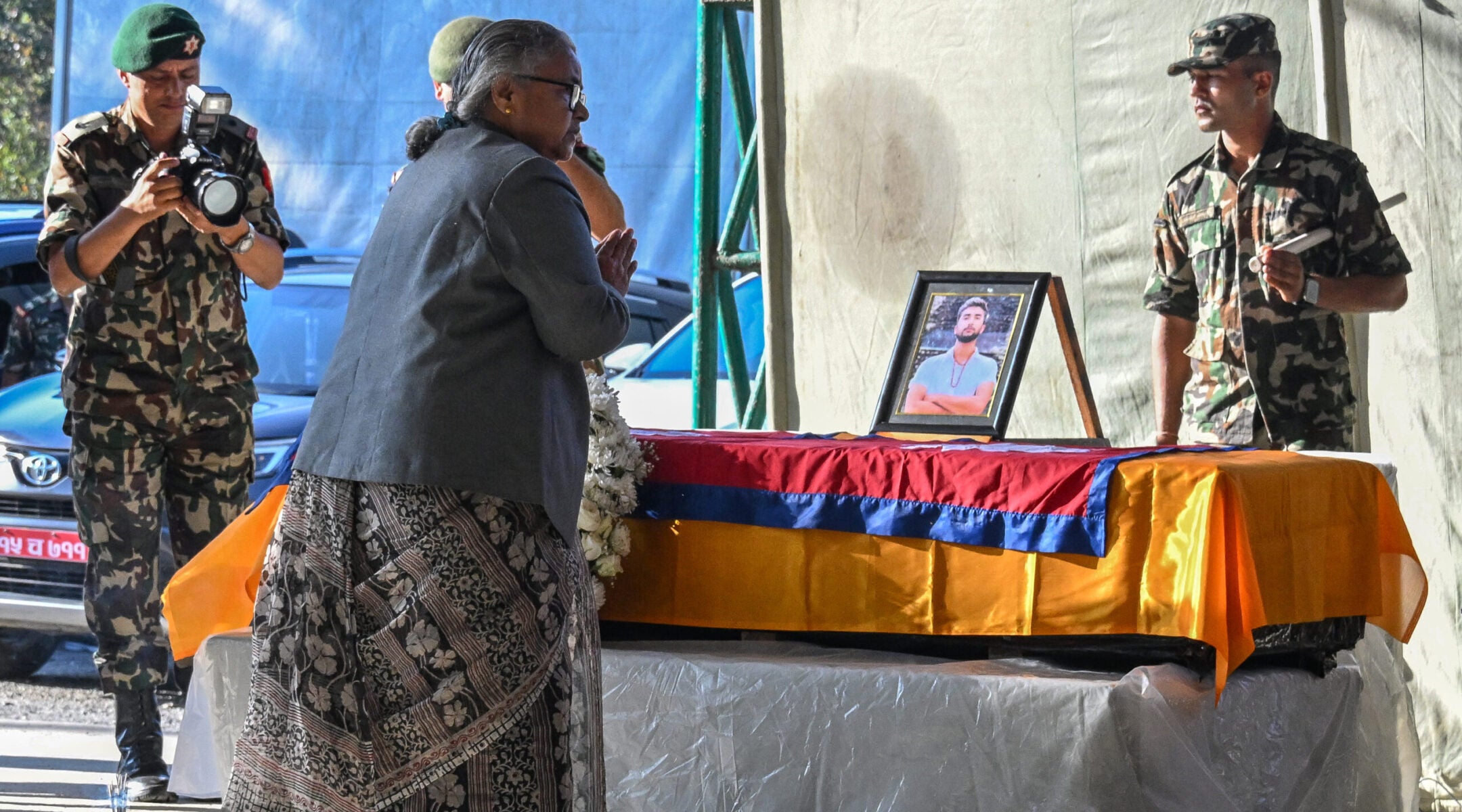
Nepal’s interim Prime Minister Sushila Karki pays respects after draping the country’s national flag over the coffin of Bipin Joshi at the Tribhuvan International Airport in Kathmandu on Oct. 20, 2025. (Prakash Mathema / AFP via Getty Images)
Bipin, Himachal, Rajan, Prabin, Prabesh and Padam, leaping over the corpses and injured bodies of their friends, made their way into the dining room.
There, a few Thai workers were also hiding. Some of their friends had been murdered while sleeping in their beds.
Narayan, Lokendra and Dhan decided to move to the residency area. Upon hearing a car outside, Narayan went out to check if it was the ambulance he was waiting for. He was shot twice by a passing terrorist.
Crawling back into the room, covered in blood, water was his last request.
Kibbutz Alumim, Kitchen | Oct. 7
A defensive wall of Persian rice sacks — that’s what they constructed to shield themselves from further grenade attacks. Prabin came up with the idea, and they quickly stacked the sacks on top of each other.
It was a small kitchen; options for shelter were limited. Most of the Nepalese and Thai workers crouched behind the “rice wall,” under a wooden table, with Parmod hiding under the sink. Bipin, positioned in the middle and not shielded at all, grew increasingly worried about their friends left in the shelter.
As time passed without any sign of rescue, Bipin considered going back to help them. “We need to think about our next steps. Will you come with me and help bring our friends here?” he asked Himachal.
They sought the opinion of a Thai worker who’d been hiding in the kitchen before them. His name was Phonsawan Pinakalo, a 30-year-old tractor driver who’d arrived in Israel four years earlier, to earn a salary that was four times what he would’ve earned in Thailand. They communicated using Google Translate, going back and forth between Nepali and Thai.
Phonsawan’s response was unequivocal: “Don’t do it. If you do it, you’ll die. We’ve heard the terrorists walking around here for hours.”
On the other side of the table, Rajan tried to reassure his roommates Prabin, Prabesh, and Padam. “Don’t worry, nothing will happen. Help will come soon.”
Exhausted by their ordeal in Israel, Prabesh declared, “If we survive, we’re heading back to Nepal as soon as possible.”
An hour and a half later, Hamas terrorists broke down the kitchen door, shouting “Allah-hu Akbar” and shooting indiscriminately. The makeshift wall of rice sacks offered no protection.
The bullets pierced the sacks and hit them. Blood and rice was spilled on the floor.
“Prabin, how bad is your leg?”
“It’s bad. I can’t feel much of it. And you, Himachal?”
“You see the holes in my chest and shoulder, right? It’s getting harder to breathe.”
“We need water. I can’t bear this.”
Struggling, Himachal rose from their hiding spot under a cheap wooden table to fetch water. As he moved, he aggravated his chest wound and lost more blood. He managed to collect some water in a shallow plate, but half of it spilled as he returned to Prabin on the kitchen floor.
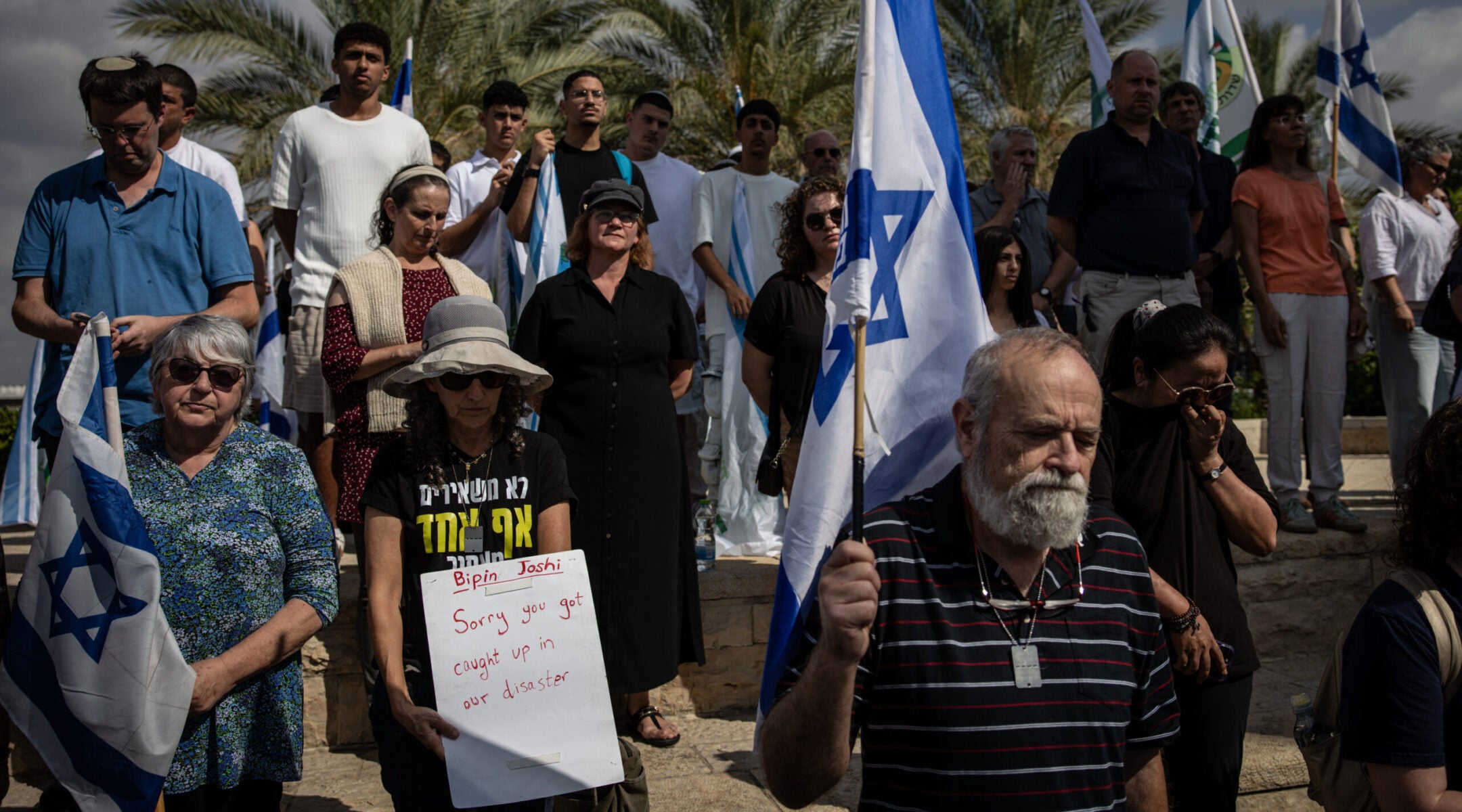
Israelis attend a farewell ceremony for Bipin Joshi at Ben Gurion Airport on Oct. 19, 2025. One holds a sign that says, “Sorry you got caught up in our disaster.” (Chris McGrath/Getty Images)
It wasn’t enough. Prabin’s throat was parched and he was writhing in agony.
“Pramod, do you have any water to give me? I beg you.”
Pramod didn’t respond. Hidden under the sink in a small plumbing cabinet, he was the only student unharmed, unseen by the Hamas shooters.
“Pramod, there’s water in the sink above. I beg you, I can’t move to get it. I’m so thirsty, I might scream, and they’ll come again and finish us off.”
He pleaded again and again, until Pramod made a small hole in the sink pipe and collected some of the murky water in a pot. Extending his hand from the cabinet, Pramod whispered, “Here, this is all we have.”
Prabin lapped up the mixture of water and urine. His roommates, Rajan and Prabesh, lay under the table as well: They were dead, killed immediately.
Padam, a fourth roommate, took longer to die. “I am dying, bhauju,” he managed to send a short text-message to his sister-in-law, then plead with his friends to help him: “Kill me. I can’t stand this anymore, kill me with a knife if you can.”
“Please, friend, bear this pain. The police will come for us,” Himachal said, though he believed they were all doomed. Beneath the table, he noticed his own breathing growing heavier and heavier, matching the heavy breathing of Padam and Parbin.
Oct. 8 – The Present
The men who arrived in Israel as “neutral” replacements for Palestinian workers ultimately returned to their home countries either empty-handed or in coffins.
Out of the 17 Nepalese students at Alumim, 10 were killed, four injured, two survived unharmed — and Bipin was taken hostage alongside Phonsawan.
From their hiding spot in the kitchen, Himachal and Prabin overheard one of the terrorists questioning the two hostages about their religion, to which Phonsawan responded, “Buddhist, Buddhist, Thailand, Thailand.”
Two hours later, Bipin and Phonsawan were seen with their captors being pushed into a-Shifa Hospital in Gaza City.
With the onset of war, the thousands of Thai and Nepalese workers in Israel left the country, causing the collapse of the Israeli agricultural sector.
In the midst of harvest season, Israel was once again in desperate need of guest workers. In December 2023, the government of Malawi, one of the world’s poorest countries, announced it would send about five thousand young people to work in Israeli agriculture. Hundreds of Sri Lankans also joined, putting money over safety.
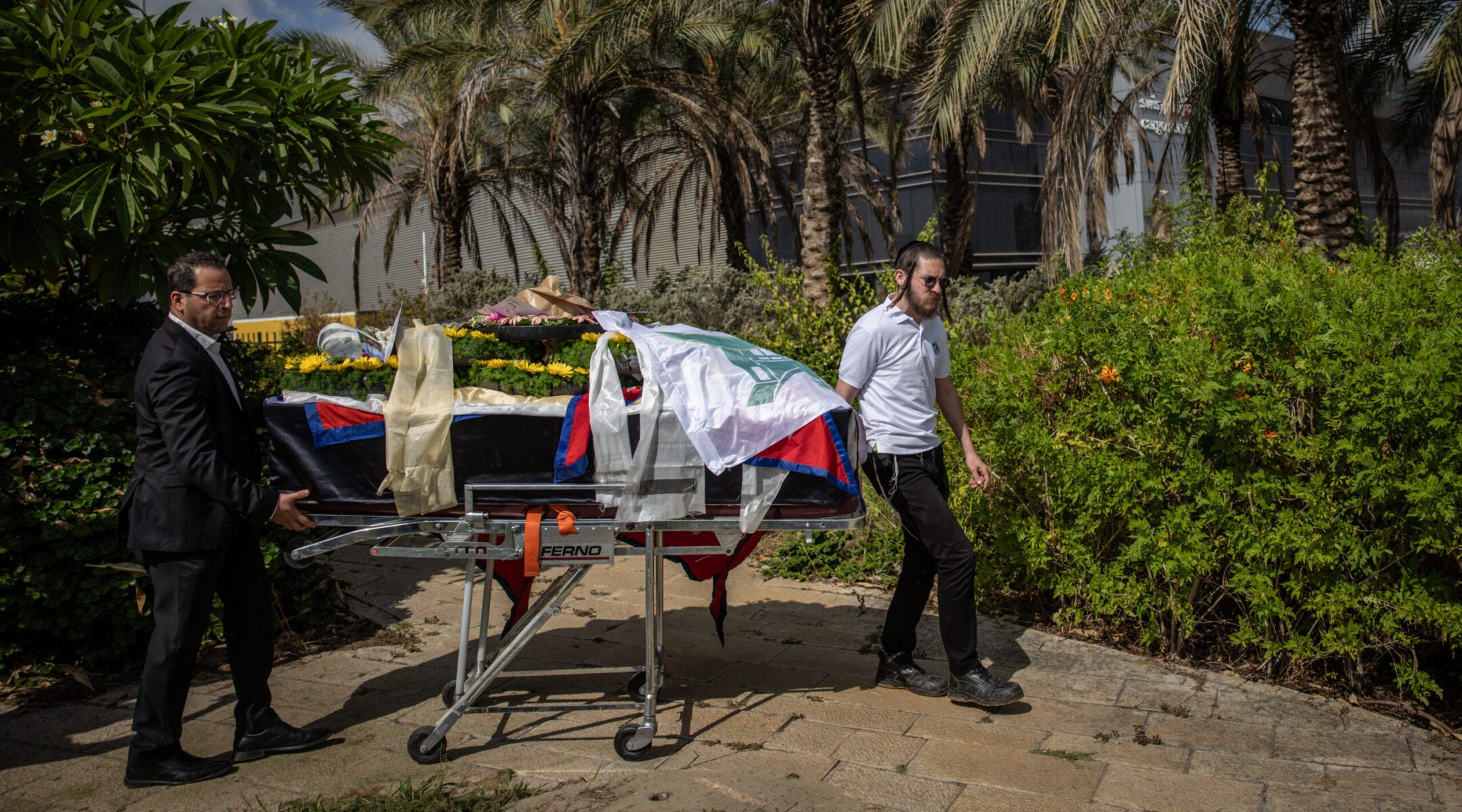
Men take the coffin of Bipin Joshi, to a car after a farewell ceremony for Bipin Joshi, a young Nepalese man who was taken hostage on Oct. 7, 2023 and later died in captivity in Gaza, at Ben Gurion airport on Oct. 19, 2025. (Chris McGrath/Getty Images)
Himachal and Prabin spent several months in Israeli hospitals, lonely, unable to communicate adequately, facing a range of complex surgeries and medical procedures. Eventually, they managed to recover and even continue their studies, earning their master’s degree from Robert H. Smith Faculty of Agriculture, Food and Environment in Rehovot last month.
At some point, Phonsawan was added to the list of dead; his body was returned and flown to Thailand this week. But Bipin’s fate remained unknown.
During two years of war, Bipin’s family lived in agonizing uncertainty, not knowing whether their son was alive or dead. They were disappointed through two ceasefires, when Thai citizens who’d been taken hostage were released, and as government officials expressed “grave concern” for his life. Clinging to hope, they did everything in their power to raise public awareness about their son, a young man trapped in a foreign conflict.
Their worst fears were confirmed last week when Bipin’s corpse was returned to Israel, on the first day of a new ceasefire that brought with it the release of all 20 living hostages in Gaza.
“With immense pain, we received the worst news imaginable. Our dear son, Bipin — brother and soulmate to our daughter Pushpa — was murdered in Hamas captivity. Bipin left us full of excitement, setting out for a year of study in Israel. We never imagined that the hug we gave him then would be our last,” the Joshi family said in a statement.
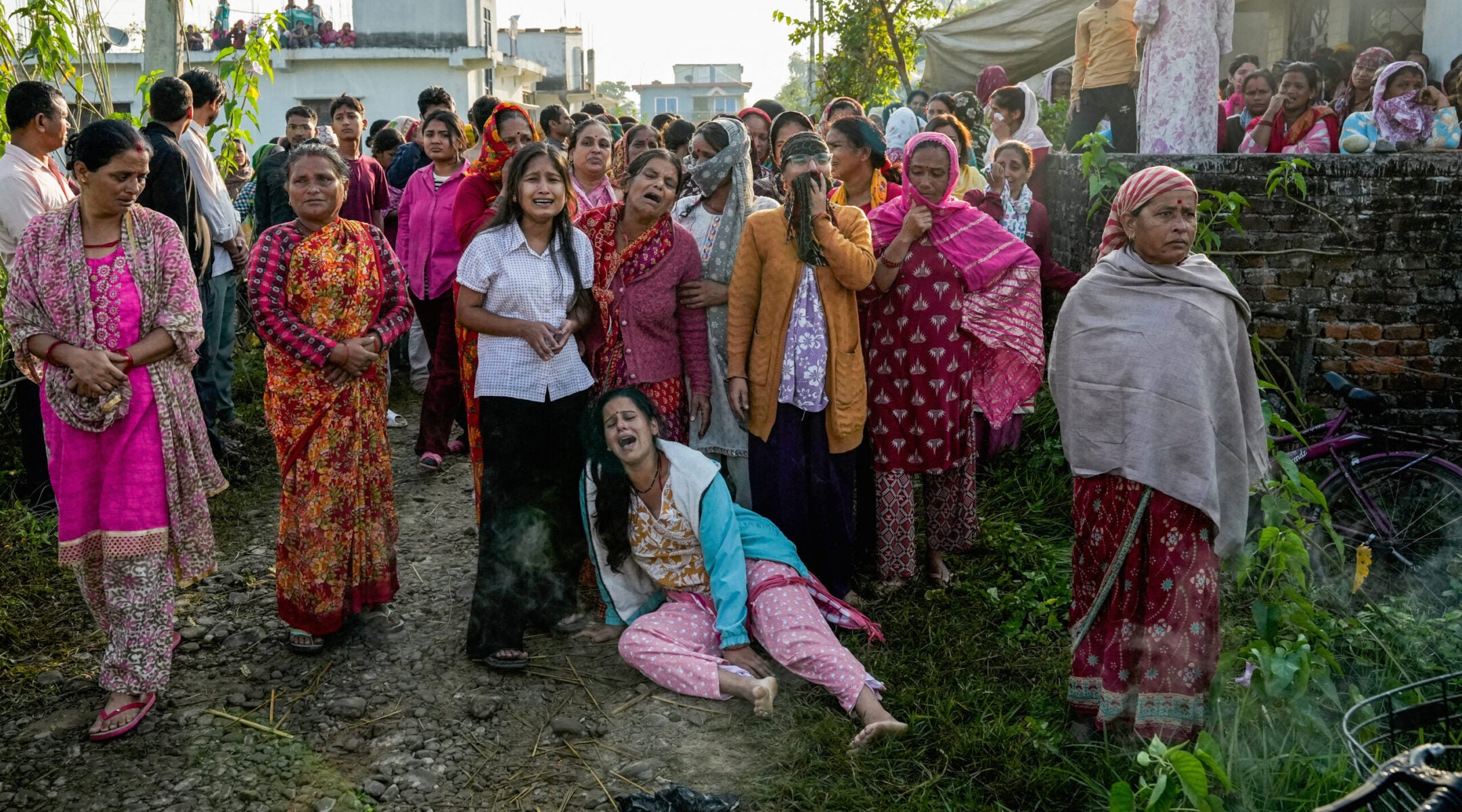
Family members mourn during the funeral ceremony of Bipin Joshi at his residence in Kanchanpur, Nepal, on Oct. 21, 2025. Prakash Chandra Timilsena/AFP via Getty Images)
“Before you were taken, you managed to send a message to your cousin, asking him to be strong and always look toward the future. It is hard to imagine a future without you, Bipin,” the statement continued. “Every flower in the garden we planted for you will remind us of you — every orchard, every field. You are part of the landscape of Nepal, and now also part of the landscape of the Land of Israel.”
On Monday, Bipin made his journey home. The first stop was a ceremony at Ben Gurion Airport, where a top government official praised his heroism and addressed him directly, saying, “I am sorry. It shouldn’t have ended this way.”
Then, Bipin’s body was flown to Kathmandu, where Prime Minister Sushila Karki draped Nepal’s flag over it during a brief ceremony at the airport.
And from there, his coffin was taken to his village where on Tuesday morning, after a night in which his family was reportedly accompanied by so many who had provided comfort over the last two years, his body was cremated in a ceremony on the banks of the Mahakali River. Government representatives were present, and the photograph that had become famous in Israel and beyond was on display. Bipin was home in Kanchanpur, the borderland district whose soil nurtured his dreams and now his memory.
—
The post Bipin Joshi was in Israel for 23 days before Oct. 7. This week, he was buried in his native Nepal. appeared first on Jewish Telegraphic Agency.
Uncategorized
India’s Modi Visits Israel, Expresses Support for Jewish State as US-Iran Tensions Mount

India’s Prime Minister Narendra Modi and Israel’s Prime Minister Benjamin Netanyahu attend a welcome ceremony upon Modi’s arrival at Ben Gurion International Airport in Lod, near Tel Aviv, Israel, Feb. 25, 2026. Photo: REUTERS/Shir Torem
India’s Prime Minister Narendra Modi arrived in Israel on Wednesday for a two-day visit that both countries have cast as a chance to deepen relations, as regional concerns mount over the risk of military conflict between the United States and Iran.
In an address to the Israeli parliament, Modi told lawmakers that India stood with Israel “with full conviction” as he shared his nation’s condolences over the October 2023 Hamas attack.
“Like you, we have a consistent and uncompromising policy of zero tolerance for terrorism, with no double standards,” he said.
Both Modi and Israeli Prime Minister Benjamin Netanyahu, who also addressed the parliament, spoke of terrorist attacks that their nations had faced, with Netanyahu saying India and Israel both faced the challenge of confronting “radical Islam.”
Some opposition lawmakers briefly walked out of the special session, protesting at the speaker’s decision not to invite the head of the Supreme Court, but returned for Modi‘s remarks.
Netanyahu’s right-wing government, which the speaker belongs to, has had a confrontational relationship with the court.
Modi, a Hindu nationalist, became the first prime minister in India’s history to visit Israel in 2017, during which he and Netanyahu took a barefoot stroll on a beach in the northern port city of Haifa.
Both still in power nearly nine years later, the two leaders, who describe one another as friends, are expected to hold talks on artificial intelligence as well as defense at a time when Israel is seeking to increase its military exports.
An Israeli government official said Modi‘s visit would “pave the way for new partnerships and collaborations across many fields.” Bilateral ties were on the cusp of a significant upgrade, an Israeli foreign ministry official said.
US MILITARY BUILDUP NEAR IRAN
Modi is visiting as the United States deploys a vast naval force near Iran‘s coast ahead of possible strikes on the Islamic Republic, with the two countries at an impasse in talks over Tehran’s nuclear program. The Pentagon has also deployed an aircraft carrier to the Mediterranean, bound for Israel‘s coast.
A US attack on Iran could draw Iranian retaliation against Israel as well as US military facilities in Gulf Arab countries, where millions of Indians live and work and send home billions of dollars of remittances each year.
In his speech to lawmakers, Modi vaguely spoke about the challenges facing stability in the region, acknowledging that the landscape had become more challenging in recent years, but made no mention of the US military build-up, or of Iran.
He backed the US plan to end the war in Gaza, telling the parliament that it could lead to peace “for all people of the region, including by addressing the Palestinian issue.”
“The road to peace is not always easy. But India joins you and the world for dialogue, peace, and stability in this region,” Modi said.
Uncategorized
CIA Launches Fresh Social Media Push to Recruit Iranians as Trump Threatens Military Action

The seal of the Central Intelligence Agency is shown at the entrance of the CIA headquarters in McLean, Virginia, US, Sept. 24, 2022. Photo: REUTERS/Evelyn Hockstein
The US Central Intelligence Agency has posted on social media new Farsi-language instructions for Iranians wishing to securely contact the spy service.
The CIA recruitment effort comes amid a massive buildup of US military forces in the Middle East that President Donald Trump could order to attack Iran if talks with the US set for Thursday fail to reach a deal on Tehran’s nuclear program.
Trump began laying out the case for a possible US operation in his State of the Union speech on Tuesday, saying he would not allow the Islamic Republic, which he called the world’s biggest sponsor of terrorism, to have a nuclear weapon. Iran denies seeking a nuclear arsenal.
“They [Iran‘s leaders] want to start all over again, and are, at this moment again pursuing their sinister ambitions,” he said, accusing Iran of restarting its nuclear program, working to build missiles that “soon” would be capable of reaching the United States, and of being responsible for roadside bombings that have killed US service members and civilians.
“The [Iranian] regime and its murderous proxies have spread nothing but terrorism and death and hate,” the Republican president said about 90 minutes into his annual address to a joint session of the Senate and House of Representatives.
The CIA posted its Farsi-language message on Tuesday on its X, Instagram, Facebook, Telegram, and YouTube accounts.
The message is the latest in a series by the CIA aimed at enlisting sources in Iran, China, North Korea, and Russia.
The agency urged Iranians wishing to make contact to “take appropriate action” to protect themselves before doing so and avoid using work computers or their phones.
“Use a new, disposable device, if possible” and “be aware of your surroundings and who may be able to see your screen or activity,” continued the message, adding that those who make contact, provide their locations, names, job titles and “access to information or skills of interest to our agency.”
Those individuals, said the message, should use a trusted Virtual Private Network “not headquartered in Russia, Iran, or China,” or the Tor Network, which encrypts data and hides the user’s IP address.
The CIA declined to comment. Iran’s delegation to the United Nations did not immediately respond to a request for comment.
US envoys Steve Witkoff and Jared Kushner are scheduled to meet Iranian officials led by Foreign Minister Abbas Araqchi in Geneva on Thursday for a new round of negotiations on Tehran’s nuclear program.
Trump has threatened military action if the talks fail to reach an agreement, or if Tehran executes people arrested for participating in nationwide anti-government demonstrations in January.
Rights groups say thousands of people were killed in the government crackdown on the protests, the worst domestic unrest in Iran since the era of its 1979 Islamic Revolution.
Uncategorized
UK Green Leader Backs Proposed ‘Zionism Is Racism’ Party Platform

A Green Party march in London. Photo: Alan Stanton/Flickr
The top official in the United Kingdom’s Green Party has come out in support of a “Zionism Is Racism” motion to be debated at the party’s March conference which could shift the leftist political organization’s official position to full-scale removal of Israel off the map, to be replaced with “a single democratic Palestinian State in all of historic Palestine with Jerusalem as its capital.”
Lubna Speitan, a British-Palestinian Green Party member who serves in the Greens for Palestine Steering Group and the Greenwich Palestine Alliance, on Tuesday announced she had submitted Motion A105, creatively titled “Zionism Is Racism,” for debate at the UK Green Party’s Spring Conference on March 28.
The measure has received the support of Green Party Leader Zack Polanski.
“I’ll wait to hear the debate, but absolutely, if the definition of Zionism is what is happening right now by the Israeli government, then yes, absolutely, that’s racist and I’ll vote for it,” he said on Times Radio.
However, Speitan’s proposal goes much further than condemning Zionism — the national movement of the Jewish people to reestablish a state in their ancient homeland — as an allegedly racist ideology, a slander which the Soviet Union’s espionage agencies began promoting in the 1970s, most notably and successfully at the United Nations General Assembly with the passage of Resolution 3379 on Nov. 10, 1975. The infamous measure, which asserted that Zionism was “a form of racism and racial discrimination,” was ultimately overturned in 1991.
The Soviet Union’s effort to link Zionism to racism drew arguments from the notorious “Protocols of the Elders of Zion” and argued that Judaism’s concept of “the chosen people” promoted racial superiority.
“This deliberate slur interpolated and distorted the real meaning of Judaism which explains the Jewish people are ‘chosen,’ or set apart, for special and burdensome religious and social obligations,” according to the American Jewish Committee.
Speitan’s measure calls for the Green Party to adopt Hamas’s position of eliminating Israel from the map, to replace the Jewish state with a Palestinian state.
The motion offers eight points, the third of which appears to call for either the mass expulsion or genocide of the Israeli people: “Following from Motion E05, which affirmed that Israel is an apartheid State committing genocide, and Motion E07 supporting reparations and accountability, the Green Party supports the establishment of a single democratic Palestinian State in all of historic Palestine with Jerusalem as its capital, equal rights for all, and the right of return for Palestinians and their descendants.”
Speitan connects this call for “the right of the return” with announcing an end of a Jewish state. This longstanding Palestinian demand insists that potentially millions of descendants of Palestinian refugees should return to the land of Israel, a step that, according to many pro-Palestinian activists, would result in the abolition of the world’s only Jewish state.
The measure also advocates explicit support for terrorism against Israel, with point four stating that the Green Party would affirm “the Palestinian people’s inalienable right to self-determination, including the right of the Palestinian people to resistance and liberation from Israeli occupation, domination and subjugation, and acknowledges that the struggle to achieve that liberation by all available means under international law is legitimate.”
This apparent advocacy of violence aligns with statements made last year by Speitan in support of terrorism against the Jewish state.
“The only way forward for the liberation of any people is going to be by force, what was taken by force must be returned by force and this comes with military intervention, and for me I support our right to the armed struggle. We must never deny that,” Speitan said in a September 2025 speech. “I will refuse to condemn the resistance of any repressed or occupied people because we have that right. Only we can claim self-defense, not the occupier.”
Speitan continued, “The moment we rise, we call for resistance, [they say] ‘you terrorist.’”
John Mann, the UK government’s independent adviser on antisemitism, labeled Speitan’s anti-Zionist proposal “support for terrorism and overt racism against Jews. There is no ambiguity. It’s from the extreme margins of politics.”
He went on to invoke former UK Labour Party Leader Jeremy Corbyn, whose time at the helm of the party was marked by a succession of scandals involving antisemitism, to show how extreme the Green Party has become.
“This is well beyond anything that happened during Labour under Jeremy Corbyn,” Mann declared. “This makes Corbyn look like a moderate. The crank element that even Corbyn was worried about has entered the Greens en masse.”
Speaking to Britain’s Daily Mail, Israel’s Deputy Foreign Minister Sharren Haskel labeled the motion “one of the most hateful and racist documents I’ve ever read.”
“It calls for the destruction of Israel and seeks to justify terrorism against Israel,” Haskel added, referring to the proposal. “Its intent is to justify the destruction of the Jewish homeland and deny the right of Jews to a national home. The double standards are extraordinary as they demand a national home for Palestinians but not Jews.”
Haskel added, “I completely condemn this horrific document and hope the people of the UK see the Greens for what they are – a racist and hateful political party.”
The group Jewish Greens has urged voting against Speitan’s proposal.
“This is not your run-of-the-mill motion opposing Israel’s actions (something that Jewish Greens would have no problem with), but something much more problematic that is likely to make Jews feel unwelcome in the Green Party,” the group stated. “We urge Green Party members to listen to their Jewish comrades within the party, and consider whether this motion is appropriate for the type of party they want to be in.”
The statement urged for a broader understanding of Zionism, explaining that “calling all forms or interpretations of Zionism ‘racism’ is painting a very diverse group of people with a very broad brush and in effect, it accepts the most extreme right-wing version of Zionism (aka – Kahanism) peddled by the far right as definitive. This is like accepting the EDL’s definition of Englishness. Or like banning all forms of USA nationalism based on the horrendous crimes of the Trump administration.”
Reflecting on the degree with which the party had shifted in recent years, Mann called Speitan’s measure “about as far away as from Green politics of the past as is possible. Greens used to be about stopping fossil fuels and nuclear power and building wind farms. Now hate is bringing members surging into the Green party.”
On Oct. 19, 2025, the Green Party of England and Wales announced that “membership has surged past the Conservative Party, making the Greens the third largest party in the UK. From this position, and with Labour’s clear shift to the right, it’s clear that the Greens are now the Party of choice to counter Reform and their brand of divisive politics.”
The party stated that “membership now stands at over 126,000. This latest milestone marks an 80 percent increase since Zack Polanski was elected Leader of the party last month. The Greens now have more than double the reported members of the Liberal Democrats.”
Polanski said then that British politics “is changing and support for old-style parties built on privilege and power is shrinking. Increasing numbers of people are walking away from the politics of austerity, inequality and division and choosing a new kind of politics that offers a bold, hopeful vision of prosperity, equality and unity. Our membership boom reflects growing public frustration with the political status quo and a hunger for genuine alternatives.”
According to the UK’s Jewish News, Polanski has faced mounting pressure to support the latest anti-Zionist motion from a new group of hardline anti-Israel activists within the party. “Supporting the motion would effectively mean declaring his own mother and other members of his Jewish family — staunch supporters of Israel who have criticized pro-Palestine marches — as racists,” the outlet noted.
A YouGov poll of UK party preferences conducted Feb. 9-10, 2025, placed the Greens as the fifth most popular party in the country coming in at 9 percent support compared to the Liberal Democrats (14 percent), Conservatives (21 percent), Labour (25 percent), and Reform UK (26 percent). A total of 21 percent of Britons polled said they would consider voting for a Green candidate with higher levels of support among those 18-24 (36 percent) and 25-49 (27 percent).
In Britain’s House of Commons, Green politicians currently occupy four seats compared to 404 controlled by Labour, 116 to the Conservatives, 72 to Liberal Democrats, 13 independents, 9 members of the Scottish National Party, and 8 members of Reform UK. Pollsters in the UK have found considerable crossover between the Liberal Democrats and the Greens with 51 percent of the members in each party supporting a merger with the other.
The Jewish Greens explained the practical implications of what adoption of the “Zionism Is Racism” position would entail for the party, noting that any member supporting Zionism could then potentially be expelled, a position which the Democratic Socialists of America (a group with 78,000 members) explicitly adopted last year.
“Most Jewish institutions in the UK have some sort of connection to Zionism. Some closer, some less so. The motion proposers – in a response to a question from Jewish Greens – have made it clear that they will expect the motion to proscribe Zionists,” the Jewish Greens stated. “This gives the party the option to expel almost any Jew involved in organized communal life or who has ever been, including our party leader. Meaning that most Jews in the party – whether they define themselves as Zionists or not – are one grudge away from being dragged through the disciplinary process on spurious charges of ‘Zionism.’”


